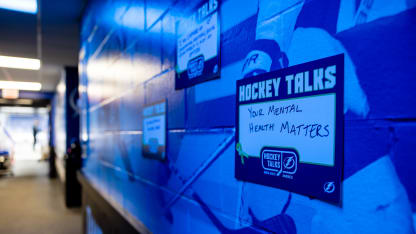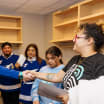Brandon Hagel
For Brandon Hagel, Hockey Talks Night hits very close to home. Over the course of just one year, Hagel lost two of his uncles, both of whom took their own lives after silently battling with mental health struggles.
“Sometimes you can just never tell,” Hagel shared. “That's obviously what went on in my family and that's kind of just why it's a big part of my life. I was lucky enough to actually have not had the experience of losing a family member at that time.
“It was in 2017 and 2018 when they passed, pretty well a year apart. It affected us big time, but it also brings you closer as a family.
“Life’s short. You never know what's going to happen. It impacted our lives terribly, but it also brought us closer as a family. We know they're always watching.”
When Hagel started battling some mental health issues of his own, he knew how important it was to get help. Like many others in the same situation, the first thing that went through his head was, ‘What are people going to think about me?’
But through his past experiences, Hagel knew how important it was to reach out and get help, so he did. Now, he maintains that it was the best decision he could have made.
“I was able to get help and it really did help me out when I was going through that,” said Hagel. “That's just something I would put on everyone. If you need to reach out, it's always there.
“That's kind of why I do it (share my story). I want people to be happy. It changed my life, getting help, and it changed my life in different ways.
“I knew I needed it. I was going down the wrong path and fighting something because of what happened to my uncles. I was just not going the right way. I was going the wrong way.
“Finally, one day, I realized that. And the person that was able to help me out, I've never had a better connection or a better person to be able to talk to.”
Hagel’s biggest message regarding mental health is clear. Is it hard to reach out and ask for help? Of course, it is. Is it worth it to see past the fear and find someone to talk to? Absolutely.
“Sometimes you're not comfortable,” said Hagel. “You’re always going to have that in the back of your head. But if you put both feet in, I think you'll really enjoy it.
“I’m so grateful for the platform that I have and for me to be able to share this story and maybe help other people. I was like anyone else. I was worried to put two feet in and go get some help, but that's why I want to push it as much as I can to help other people, because it really did change my life.”
Hockey Talks Night isn’t an easy night for Hagel. The memories it brings back are hard to deal with. But if the game can help raise awareness for those who need it, he’s all for it. On Thursday night, he’ll be playing for his uncles.
Tyler Motte
About six years ago, Tyler Motte was diagnosed with anxiety and depression on a day that he still considers one of the hardest of his life. Reaching out for help for the first time was a challenge for Motte, who was encouraged by his wife to find some support.
As an athlete, he didn’t want others to see him as anxious or depressed. When he heard the diagnosis for the first time, he wrestled with the fact that these were things he’d be dealing with for the rest of his life. At first, it felt like he made the wrong choice with the way the diagnosis made him feel.
Looking back now, it wasn’t easy, but he knows he made the right decision and wants to help others feel confident that they should do the same.
“I think, without taking that first step, and probably taking those two steps back with the diagnosis, I would never have been able to take however many steps I've taken forward,” said Motte. “It was probably one of the hardest days of my life hearing that from a personal standpoint. There’s been hard days reflecting on how and why you were where you were and how and why you want to get to where you're going to get to.
“Hearing the diagnosis and the words associated with it, like how I had been feeling and when I know that I'll be feeling those ways in the future, it's kind of hard to redefine those words for yourself.
“But, like anything else, it's a day-to-day process. You keep working at it and things do get easier. You become more equipped to handle the tough times and the bad days. Ultimately, hopefully, you can help others that are feeling the same way.”
Motte has certainly helped a lot of people that are going through similar challenges. While playing with the Vancouver Canucks, he shared his story a couple times to support Hockey Talks Night. At first, he didn’t realize how many people would hear his story. Thankfully, a lot of people did. And that was exactly what many of them needed to help them on their journey.
“They were kind of a driving force behind the Hockey Talks Night,” Motte said. “I think doing it on what was ultimately a bigger scale than maybe I realized at the time, that part was a little frightening to me because I hardly had my friends and family know, let alone a fanbase or a city or really anyone who had the Internet at that point.
“But there were a lot of people that would reach out on social media or whatever it was. It’s impossible to contact and communicate with everybody, but seeing the number of people who were not only appreciative of me sharing the story, but who had been going through it themselves or had known friends and family that were going through it, I think that really opened my eyes to the amount of people that mental health does impact.
“I think that allowed me to feel more comfortable in my own shoes, so I'm grateful for those people who did reach out or the one-on-one communication I've had with people about it. It's a tough conversation to have, but I think ultimately the more times you have it, the more you allow others into your community and into your support system.”
Motte says reaching out was the best decision he could have made, and he continues to urge others to do the same. Whether that’s reaching out for help or checking in on those close to you, both can have a major impact on someone’s life.
“I think that was something I'm still working on today, but that was the biggest thing for me, was knowing when to reach out and knowing when to tell my friends and family that I wasn't in the best place,” shared Motte. “Ultimately, everyone wants to help you get there, but sometimes it's just being in a position to listen and hear what's going on.
“How can you be available? A lot of times, it's just lending an ear, letting someone vent a little bit and hopefully creating an environment that supports people's mental health and supporting each other in a positive way. I think that's something I've learned and am continuing to learn. I want to ultimately be there for others.
“Obviously, being on a new team and a new organization, you try to find that fit a little bit, but you also have to understand the ways that you can help the room and the ways that the room can help you. That’s obviously still an ongoing process. I do know it's something that's going to be with me. There's not necessarily a cure or fix for it, but I think what really helps me push on is knowing that, or hoping that, I can help other people find better days.”
Nick Paul
While playing on the lacrosse team in high school, one of Nick Paul’s favorite teammates didn’t show up to school. This teammate had a happy-go-lucky personality and was seemingly always in a good mood, consistently cracking jokes with his friends.
When this teammate didn’t show up for school, Paul and his friends assumed he was just sick. The following day, the news came out that the young man had taken his own life.
“It was hard, especially at that age,” said Paul. “You don't really think about that. I didn't have any dealings with that before.
“I think, honestly, just my family kind of talking to me and telling me it's okay to show emotion and kind of walking me through that [was big]. Then, the lacrosse team and the people at school all worked through it together and talked about it and being there for one another.
“I had a really good support system, and I was very lucky. I know it's not always that way with people that are going through situations like that. But luckily, there's resources that you can call. There's resources that you can go and see and talk about things.”
After Paul’s teammate passed away, he could hardly believe it really happened. No one ever saw it coming. It was at that moment that he decided if he ever had a platform to raise awareness for mental health, he was going to do it.
That opportunity presented itself during his second year in the Ontario Hockey League.
“I went to the hospital there in North Bay and people through the team connected me with the right people,” Paul shared. “We had a meeting and I expressed what I wanted to do and what my vision was and my past experience.
“They were awesome. They helped me through everything. They helped me set up ‘Points for Paul’ at the time. They were awesome. They helped me go through all that.
“I went to schools and spoke a little bit. I’ve always been one to try to get in the community. They were all on board for that and helped me do that. It was great.”
Today, Paul is still giving back. Working with the Crisis Center of Tampa Bay, Paul and the Lightning Foundation launched “Points by Paul.” The program was also active during his time with the Ottawa Senators and the Bolts forward wanted to make sure he was making a similar impact with his new team.
With each point Paul records on the ice, he donates $150 to the Crisis Center of Tampa Bay in a continued effort to help those impacted by struggles with mental health.
Paul has firsthand experience going through some of those struggles, citing the numerous times he was going up and down between the AHL and NHL while with the Senators organization. Playing in the NHL was everything he imagined, but getting sent back down to the AHL was an emotional roller coaster at times.
“Going up and down, it's not easy,” said Paul. “Your dream is right in front of you, and you get to taste it and touch it a little bit. Then, all of a sudden, it's right back down. Then, you get up again and get teased a little bit and you’re back down. It kind of plays with your emotions. You’re putting everything you have into it and sometimes things just don't go your way.
“That's life. It's a roller coaster. There's going to be ups. There's going to be downs. But if there's no downs, the ups wouldn't really be that great. I think, through life, there's always going to be low spots, but it's how you're able to deal with it.
“Do you have a support system? Are you able to call someone? Are you able to talk to someone about how you're feeling and what you're going through? I think that's a big thing. I was lucky enough that I had my family with me and people around me that were really supportive. That’s how I got through it, just working through it.”
Victor Hedman
At one point or another, Lightning fans have probably seen Victor Hedman wearing a hat or hoodie with NOSOLO branding. Hedman is an ambassador for NOSOLO, a company committed to raising awareness for all things related to mental health.
With every sale, NOSOLO donates 20% of the proceeds to NAMI (National Alliance on Mental Illness), an organization that envisions a world where all people affected by mental illness live healthy, fulfilling lives supported by a community who cares.
“Mental health is a real thing,” said Hedman. “You can always see if someone is hurt on the outside if you’ve got an open wound or whatever, but what's going on, on the inside, is kind of tough to pick up. It's been a big problem in our society.
“It goes through everyone. I'm sure we all have someone that has gone through it without us knowing it. We just want to end that and make sure that people can talk to one another.
“It feels like it would be tough for us to talk about it. We’re hockey players that play this tough sport. If you can’t talk about how you feel, you can go down a dark hole very quickly. To kind of end the stigma about that is what really talks to me, and this is where words can speak louder than actions.
“We’ve just got to make sure that we try to help everyone close to us and try to make sure they feel okay talking about their feelings and how they feel.”
As a father of two, Hedman realizes that mental health struggles aren’t exclusive to a certain age group. NOSOLO has recently sent representatives to speak to audiences of 600 middle schoolers to raise awareness about mental health.
“If you’re not really feeling it or you're feeling down or you're sad, I think it's important for us to talk about that,” said Hedman. “You talk to your kids and tell them it's okay to be sad. They’re still very young, but it's okay to have feelings and it's okay to show it. That’s how I go about my business and how I feel about it.
“Like I said earlier, we're supposed to be these tough guys playing hockey, but it's okay to have bad days. It’s okay to feel down and feel sad, but make sure that you find someone to talk to.”
For Hedman, even just wearing a NOSOLO hat can have enough reach to help someone in need.
“We’re just trying to find ways to help,” Hedman shared. “I've been in contact with a family down here who lost their daughter and were going through a tough time. They saw me wearing the hat and their brand and they reached out to JT. It’s helped them tremendously.
“Just a small thing like that, wearing that hat, helped that family to start talking about it rather than holding it inside. I think that helps a lot.”
Hedman knows it’s hard to put yourself in someone else’s shoes, but you never know what the person next to you may be going through. Instead of holding his issues inside, he’s learned it’s better to speak up. With an issue like mental health that’s extremely important to him, he’s urging others to do the same.
“I know that today's today and tomorrow’s tomorrow,” said Hedman. “You’ve just got to take it day by day and try to live your fullest. You just want to do it with good mental health. If you feel sad and feel down, I've learned to talk about it instead of kind of closing it inside.
“It’s just one of the things that I think helps people feel better about themselves, knowing they're not alone in this battle. That’s kind of the way I go about it and how I try to live my life and teach my kids as well.”



















